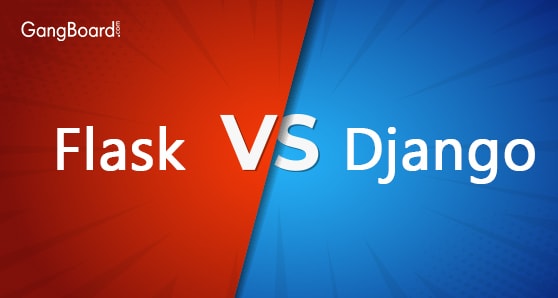
Flask Vs Django
Flask Vs Django
Flask is a web application framework. This framework is termed as micro-framework as it has no requirement for any particular libraries and tools. Django is an open source Python Web Framework. This framework follows the pattern of model-view-template architecture. This framework promotes the clean and pragmatic design of software application.
Why Flask?
Flask is an application framework that is written in the Python coding language. This framework has no dependencies on external libraries. This framework supports various extensions which could be implemented in the framework. These extensions are necessary for the form validation, object-relational mappers, open authentication systems, uploading mechanism, and several other tools.
Flask is about simplicity and minimalism. As there is no restriction on the framework, the developer would be able to implement any extension he wants. For accessing the database, developers would need to install additional stuff pure SQL and SQLAlchemy.
The framework has a modular architecture. Your developer would be able to add a framework that you might need for your business. This framework uses Jinja2 templating. This framework also provides development debugger and server to the developer. Pinterest and LinkedIn are of the application of the Flask framework application.
Why Django?
Django is an open source and free web-based application. This framework is also written in the python coding language. This framework is the collection of several modules that are necessary for the development process of application. The developer would just have to take the appropriate modules from the library of the framework. Then he needs to group them together to create new websites and applications from the existing source.
To make a new website from scratch would a lot of time and efforts. Django framework has lots of pre-written modules that would allow any developers to create a brand new site with a small amount of time. This framework gives more emphasis on the pluggability and reusability of the component.
This framework also provides an administrative interface which would include read, create, delete and update. Sites such as Instagram, Mozilla, Disqus, Nextdoor and Bitbucket actively use Django web framework system.
Difference Between Flask and Django
Flask Web Framework |
Django Web Framework |
|
Flask Web Framework does not depend on any external tools and libraries. |
Django Web Framework is an open source and free web framework. |
|
It supports an extension that could be implemented in the framework. |
Django has its own module library which contains several prewritten codes. |
|
The structure of the project layout for Flask Web Framework is an arbitrary structure. |
The structure of the project layout for the Django Web Framework is Conventional Project structure. |
|
In Flask, the request based object would be imported from the flask module and it would behave as a global variable. |
In the case of Django, the request object is observed as individual parameters. |
|
Flask uses either SQLAlchemy or Peewee for managing its database. These modules would have to install by the developer to use them. |
Django uses SQLAlchemy for its database management system. These database management systems are inbuilt in the system. |
|
Most of the project applications under Flask are single page applications (SPAs). |
The project application under Django is divided into smaller parts or chunks. This allows the developers to create these chunks and merge them together to the final application. |
|
Flask Web Framework uses Jinja2 template system. |
Django Web Framework utilizes the View web templating system. |
|
The dispatcher of the Flask Web Framework is RESTful request dispatch. |
URL dispatcher of this web framework is based on controller-regex. |
|
Flask Web Framework doesn’t support any third party applications. |
Django Web Framework could support a large number of third-party applications. |
|
Flask is a minimalistic, simple, and lightweight web application framework. |
Django is developed on the basis of batteries include approach. The batteries are necessary for the developer to make the application more quickly on this framework. |
|
Flask Web Framework is small in nature but it has an extensible framework which gives huge flexibility to the developers. The developers would be able to various development libraries and tools to make an application. |
Whereas in the case of Django Web Framework, the developer would choose from the predetermined modules of the framework to create an application. Developers would not be able to changes the codes of the module. |
|
Flask doesn’t have any administration system. The developer would have to install an ORM module to control all projects under Flask. |
Django framework has an administrator system which includes ORM (Object Relational Mapper). The developer would be able to control all projects when developing multiple projects. |
|
Flask has no inbuilt bootstrapping tool. |
Django framework uses its in-built bootstrapping tool known as Django admin. |


 +1 201-949-7520
+1 201-949-7520 +91-9707 240 250
+91-9707 240 250